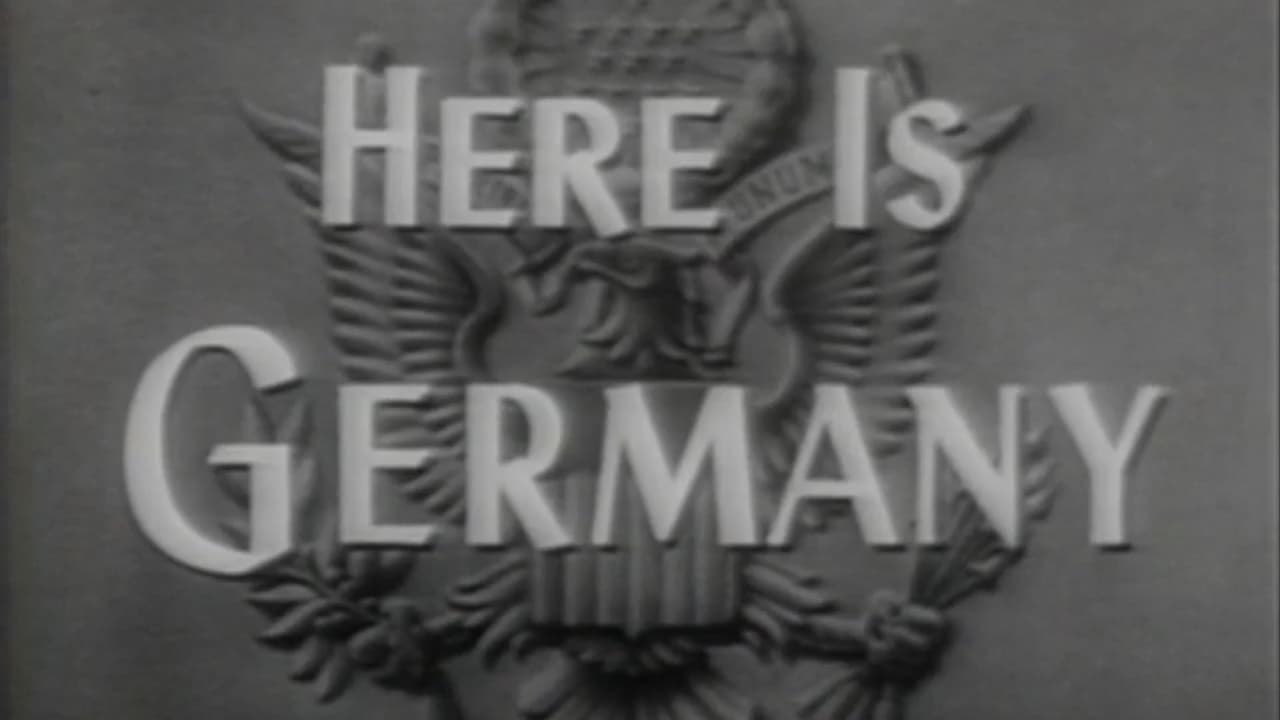BoardChiri
Bad Acting and worse Bad Screenplay
ShangLuda
Admirable film.
Fairaher
The film makes a home in your brain and the only cure is to see it again.
Lachlan Coulson
This is a gorgeous movie made by a gorgeous spirit.
Michael_Elliott
Here Is Germany (1945) *** (out of 4)Anthony Veiller narrates this entry into Frank Capra's "Why We Fight" series. This film takes a look at Germany and tries to explain how they became what they did. We start off with a "cute" scene of the narrator explaining the great things about Germany but the tone quickly changes when we see the horrors from WWII including hundreds of dead bodies as well as the furnaces where so many were killed.HERE IS GERMANY is one of the better films in the series as there's actually very little propaganda and instead it shows the horrors of the war. This series was good for the most part but there's no question that some of the comments were meant to produce anger or fear. There's nothing here that goes for fear but instead it shows what horrors Germany was actually committing in case there was someone watching who might not have realized why America was at war.There's some great discussions about WWI as well as the then current situation and how going into the future America was going to be in charge of Germany, their school books and making sure that the events that happened would never happen again.
Robert J. Maxwell
The Germans are an industrious, musical, law-abiding, tidy people -- says the narrator in this 1945 documentary by Frank Capra -- so how could they have turned into such monsters? Hitler would have said the Nazi adventures of World War II were an expression of German blood, but the writer tells us the ultimate cause was "tradition" or, as anthropologists would say, culture, not nature. Mention is made of famous German-Americans who escaped the trap of German culture: Admiral Nimitz, Wendell Wilkie, Henry J. Kaiser, and others.Then we get an oversimple but still illuminating history of German militarism over the course of a hundred years or so. Americans don't really know much about international history, not even our politicians. We see footage of actors in costume during the period of Frederick the Great and Bismark, and documentary footage of Kaiser Wilhelm, and Hitler. We hear quotes taken from the writing and speeches of various German leaders, including all the above and von Clausewitz. It's kind of amusing. The quotes themselves are so barbaric that they must have been selected for their outrageousness and were surely taken out of context. Give me a Bible or a copy of Deepak Chopra and I'll select quotes that make each of them seem like tracts promoting Social Darwinism.That initial presentation of the Germans as industrious, tidy, and so forth, establishes an eerie echo of Stephen Ambrose's description of a typical American GI's conception of the foreigners he fought with or through. The Arabs were filthy and disgusting liars. The Italians were phony and pushy. The French were dirty and couldn't be trusted. The British were stolid with no sense of humor. But the Germans were great! They knew how to take orders, they worked hard, they didn't cheat you, and they used toilet paper.There is some particularly brutal footage of the victims of Nazi genocides and executions. Not just the pile of mannequin-like naked bodies we've become used to, but close ups of rotting corpses in Belgium, Italy, and Malmedy. There are a couple of live executions too. I'm not sure everyone would want to watch them.So how does the film identify the heavies in the story? Well, Hitler and his goons, obviously. But the narrator comes very close to describing a military/industrial complex as well. This was about fifteen years before a retiring President Eisenhower warned us of the same tendency in the United States. And it gets positively spooky when the narrator describes the steps Hitler took in gaining absolute power -- destruction of unions, intolerance of dissent, a monopoly of the media, the silencing of scientists unless they agreed with the prevailing ideology, the paranoid notion that Germany was surrounded by hateful enemies, the persecution of communists and minorities. At times it sound positively frightening.But it turns comic when the future of Germany is outlined. No more self rule until they learn their democratic lesson. This time there was no "truce," just "unconditional surrender." Their industry is destroyed. They are a beaten people and must admit it. (Nothing about turning the country into a traditional agrarian state, but almost.) The leaders are now the Allied military. We'll show them. And we DID. I think it was called the Wirtschaftswunder. In fifteen years everyone was driving Volkswagens with Blaupunkt radios.Today, of course, they're the strongest economy in Europe, which isn't saying much, given the state of the global economy in general.
drystyx
1945, and the Allies won the war. There really was no need to justify it. Even then, most people in Allied countries were patriotic.So a propaganda film served little purpose. Here, Capra tries to demonetize every German instead of the Nazis in charge. Farmers and workers in Germany had no choice, and they couldn't help anyone but themselves, or they would starve. Yet Capra in one minute will say the common German was brutal and purposely aggressive, yet in the next minute admit the common German was being used.He stresses the importance of bullying the common German. That would have made room for another Hitler to use these common Germans again. Capra is full of too many lies to forgive here. He simply doesn't place the blame where it belongs. And in doing so, he makes these common Germans susceptible to the very patriotism and liberty he claims they didn't want, and then claims they did. His hypocrisy is overwhelming.If enough common Germans in 1945 were to see this and have it translated to them, they would have turned into the very sort of freedom fighting guerrillas that armies are terrorized by. Not only poor content, but poor propaganda.
Syl
Frank Capra put together this compelling documentary about Germany as a country from it's history, culture, and ethnicity. According to the film, Germany is a country of hard-working and prosperous people who love their country, their leader, and the world. But we know better now after 66 years, Germany's leaders in the Third Reich had a diabolical plan to exterminate millions of people and propagandize the notion of superior race. You have to take the documentary's time period. 1945 was the end of World War II. The concentration camps were omitted probably only because the world had already so much to understand about this country called Germany under Hitler's reign. I can only believe that Capra would have included the concentration camps if possible. By 1945, the world was recovering and the news of the holocaust would surely shock the world again if they hadn't known the details of monstrosity and inhumanity at the hands of the German Nazis themselves. It's still worth watching to see how a country of millions can be fooled by a madman and his minions.

